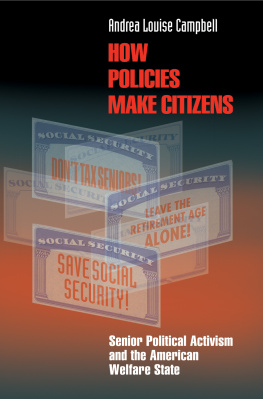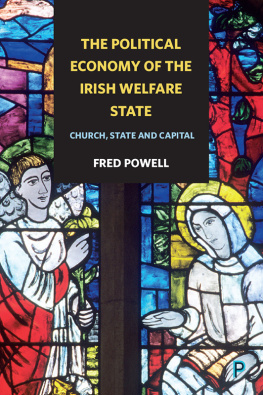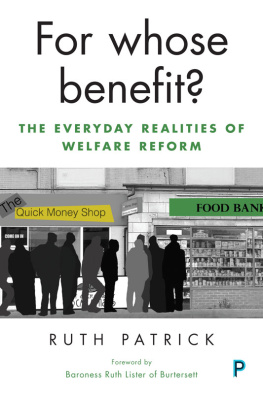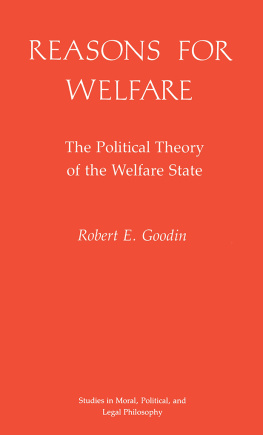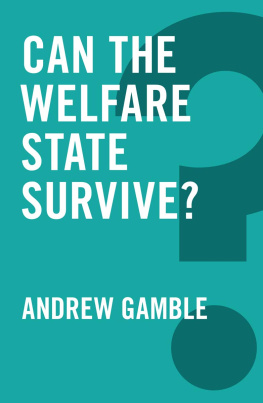HOW POLICIES MAKE CITIZENS
PRINCETON STUDIES IN AMERICAN POLITICS
HISTORICAL, INTERNATIONAL, AND COMPARATIVE PERSPECTIVES
SERIES EDITORS
IRA KATZNELSON, MARTIN SHEFTER, THEDA SKOCPOL
A list of titles in this series appears at the back of the book.
HOW POLICIES MAKE CITIZENS
SENIOR POLITICAL ACTIVISM AND THE AMERICAN WELFARE STATE
ANDREA LOUISE CAMPBELL
PRINCETON UNIVERSITY PRESS
PRINCETON AND OXFORD
Copyright 2003 by Princeton University Press
Published by Princeton University Press, 41 William Street,
Princeton, New Jersey 08540
In the United Kingdom: Princeton University Press,
3 Market Place, Woodstock, Oxfordshire OX20 1SY
All Rights Reserved
Second printing, and first paperback printing, 2005
Paperback ISBN 0-691-12250-4
The Library of Congress has cataloged the cloth edition of this book as follows
Campbell, Andrea Louise, 1966
How policies make citizens : senior political activism and the American
welfare state / Andrea Louise Campbell.
p. cm. (Princeton studies in American politics)
Includes bibliographical references and index.
ISBN 0-691-09189-7 (cl : acid-free paper)
1. Older peopleUnited StatesPolitical activity. 2. Senior powerUnited States.
3. Political planningUnited States. 4. Social securityUnited States. I. Series. II. Title.
HQ1064 .U5 C34 2003
305.26/0973dc21 2003048611
British Library Cataloging-in-Publication Data is available
This book has been composed in Sabon
Printed on acid-free paper.
pup.princeton.edu
Printed in the United States of America
10 9 8 7 6 5 4 3 2
For Allen
CONTENTS
LIST OF FIGURES
LIST OF TABLES
ACKNOWLEDGMENTS
I AM INDEBTED to a great many people who helped this book come to fruition. Many friends and colleagues commented during my years of coursework and dissertation writing that I was the happiest graduate student they knew, and I have the Political Science Department at the University of California, Berkeley, and especially my dissertation committee, to thank. Henry Brady was an ideal chair. From providing countless insights, to alerting me to appropriate data, to challenging and cheering me along, Henry propelled this project forward. I am deeply indebted to him for his enthusiasm and support. Ray Wolfinger was my closest reader and an invaluable professional guide. I learned a great deal about analysis working for and writing with Jack Citrin. Thanks to all those who taught me so much: Dorie Apollonio, Jon Bernstein, Jake Bowers, Bruce Cain, Laurel Elms, Ben Highton, Ann Keller, Samantha Luks, Jane Mauldon, Chris Muste, Eric Oliver, Nate Persily, Nelson Polsby, Ron Schmidt, Laura Stoker, and Cara Wong.
Henry Brady, Kay Lehman Schlozman, and Sidney Verba provided access to their Citizen Participation Study. I am indebted to Henry Brady for suggesting that I look into using the Roper surveys for my study. Funding for the purchase and assembly of the datanow the Roper Social and Political Trends Archivecame from a National Science Foundation dissertation improvement grant awarded to me and a grant from the Pew Charitable Trusts awarded to Henry Brady and Jack Citrin. Henry Brady, Bob Putnam, and I agreed to work together in a joint UC Berkeley/Harvard project to create the time-series dataset. Graduate students Dorie Apollonio and Laurel Elms of UC Berkeley and Steve Yonish of Wisconsin (working with Putnam) took on the enormous task of cleaning and concatenating the 200-plus surveys. I am especially thankful to the Berkeley crew for their painstaking attention to detail and commitment to this huge project.
Harvard was a fertile place to turn the dissertation into a book. And as a Robert Wood Johnson Health Policy Scholar at Yale University, I appreciated the input of Kim DaCosta, Darrick Hamilton, Brad Herring, Vince Hutchings, Jennifer Klein, Evan Lieberman, Ted Marmor, Kimberly Morgan, Abby Saguy, and Mark Schlesinger.
Christine Day, Jennifer Hochschild, Suzanne Mettler, Eric Oliver, and Eric Patashnik read the entire manuscript. The two Erics in particular pushed me hard at critical junctures to improve it. Thanks also to those who read early chapter drafts or papers that were incorporated into the manuscript: Frank Baumgartner, Ted Brader, Barry Burden, Dave Campbell, appeared previously in my article Self-Interest, Social Security, and the Distinctive Participation Patterns of Senior Citizens in the American Political Science Review, vol. 97, no. 3 (September 2002): 56574, and is reprinted with permission of Cambridge University Press.
I owe a tremendous debt to my parents for instilling in me a love of learning. And finishing a dissertation with one son and completing a book with a second would have been impossible without the assistance of Mary Ann Campbell and Miriam Feinstein, who dropped everything and came great distances to help. Those sons, Henry and Daniel, were incredibly patient with my stealing away to write. The book is dedicated to my husband Allen Feinstein, who took so much time from his conducting and composing to support and even embrace my career in political science. Just ask him what heteroskedasticity is.
HOW POLICIES MAKE CITIZENS
Chapter One
INTRODUCTION: THE RECIPROCAL PARTICIPATION-POLICY RELATIONSHIP
S OME GROUPS participate more than othersthe affluent more than the poor; the educated more than the uneducated; whites more than blacks and Latinos; the elderly more than the young. Does it matter? Do high-participation groups get more of what they want from the government? Do participatory inputs shape policy outputs? Critics allege that the American system of government inadequately represents the interests of the underprivileged, to their detriment. Indeed, one motivation driving researchers to measure participatory differences across groups is an assumption that they lead to unequal policy outcomes. Do they?
And why are some groups more politically active than others? We know part of the storysome individuals possess more politically relevant resources, like income and education, than others, some are more interested in public affairs, and some are more likely to be recruited to participate. And these factors arise from early socialization at home and in school and from affiliations with voluntary associations, workplaces, and religious institutions. But what about the role of public policy? Might government policy also be a source of political resources, a sense of stake in the system, even a mobilizing factor?
This book focuses on the reciprocal relationship between political participation and public policy. I show that mass participation influences policy outcomesthe politically active are more likely to achieve their policy goals, often at the expense of the politically quiescent. And the ability of the politically active to do so is in part a legacy of existing public policypolicy influences the amount and nature of groups political activity, often exacerbating rather than ameliorating existing participatory inequalities. Public policies can confer resources, motivate interest in government affairs by tying well-being to government action, define groups for mobilization, and even shape the content and meaning of democratic citizenship. These effects are positive for some groups, like senior citizens, raising their participation levels. For other groups, government policy can have negative effects. Because of the difficult and demeaning experience of obtaining welfare, for example, its recipients participate at rates even lower than their modest socioeconomic situations would predict.feed back into the political system, producing spirals in which groups participatory and policy advantages (or disadvantages) accrue. Citizens relationships with government, and their experiences at the hand of government policy, help determine their participation levels and, in turn, subsequent policy outcomes.

